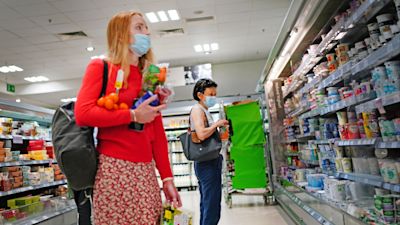Cost of living squeeze continues as inflation rises by 5.4% - highest in nearly 30 years

ITV News Economics Editor Joel Hills hears from a single mum from east London who is struggling under rising costs
The cost of living squeeze has intensified for families around the UK, rising to 5.4% in the 12 months to December.
The Office for National Statistics said the rate "has not been higher for almost 30 years" and the rate is well above the Bank of England's 2% target.
It was an increase of 0.4% from November 2021.
The bleak figures follow Tuesday's labour data, which showed recent soaring prices on household finances saw real wages fall for the first time since July 2020.
ONS chief economist Grant Fitzner said the increase was driven by rising food prices, furniture and clothing.
Household finances are being squeezed across the board as gas and electricity tariffs have also seen staggering rises and supply chain problems are pushing up costs across the economy.
The Bank of England has forecast inflation to hit 6% in April.
Policymakers raised interest rates last month, from 0.1% to 0.25%, to try to cool rampant inflation, and many experts expect another rise possibly as soon as early next month.
Mr Fitzner said: “The inflation rate rose again at the end of the year and has not been higher for almost 30 years.
“Food prices again grew strongly while increases in furniture and clothing also pushed up annual inflation.
“These large rises were slightly offset by petrol prices, which, despite being at record levels were stable this month, but rose this time last year.”
The figures come amid mounting pressure on the government to help with eye-watering rises in gas and electricity bills, with fears that many vulnerable people are choosing between heating their homes and buying food.
Chancellor Rishi Sunak said the government had put in place financial support to help those struggling.
"I understand the pressures people are facing with the cost of living and we will continue to listen to people’s concerns as we have done throughout the pandemic.
The biggest hit to consumer pockets continues to be the rises in energy bills after an October increase to the price cap, with experts warning over a leap of more than 50% in these costs when the next revision is due in April.
Meanwhile, motorists have also faced painful fuel price rises, and the ONS said average petrol prices remained at a record high of 145.8 pence a litre last month, compared with 114.1 pence a litre a year earlier.
Rising used car prices have been another factor in pushing up CPI since the beginning of 2020, according to the ONS.
But Labour's Pat McFadden, shadow chief secretary to the treasury, said the situation is "only going to get worse".
"Working families are already feeling the crunch. But the triple whammy of an imminent rise in the energy price cap, real wages falling and Tory tax rises coming down the tracks are going to make this crisis even worse," he said.
He accused the government of "looking the other way, trapping us in a high tax, low growth cycle."
Labour has said it would give families "security with fully-funded measures" to tackle the rising cost of living.